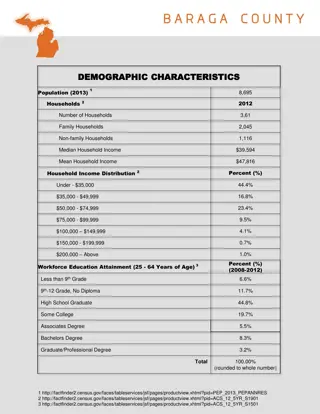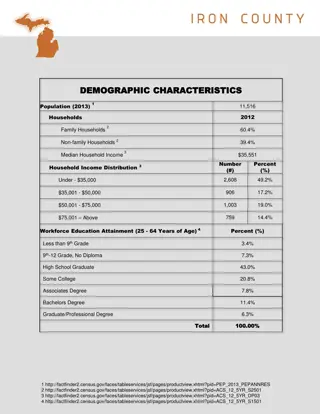Understanding Horizontal Leadership in County Government: Challenges and Solutions
County government structures often follow a horizontal leadership model, requiring collaboration among various departments for efficient functioning. Despite the absence of a single CEO, power distribution and decision-making can be complex. Legal limitations exist on imposing unified personnel policies. Achieving consensus among departments is crucial for effective governance.
Download Presentation

Please find below an Image/Link to download the presentation.
The content on the website is provided AS IS for your information and personal use only. It may not be sold, licensed, or shared on other websites without obtaining consent from the author. Download presentation by click this link. If you encounter any issues during the download, it is possible that the publisher has removed the file from their server.
E N D
Presentation Transcript
County Structure Kristi Harshbarger, ISAC General Counsel ISAC Spring School Educational Seminar March 14, 2024
Disclaimer The Iowa State Association of Counties (ISAC) provides education and information primarily as a general service to ISAC members. This communication, or any other communication with ISAC, does not create an attorney-client relationship. The information provided should not be interpreted or used as a substitute for a legal opinion from your county attorney or otherwise retained and qualified legal counsel.
Organizational Chart I used to display a graphic here of the county departments. It was from 2003. Things have changed. Who remembers CPCs from before Regions? It didn t accurately describe the quasi-independent boards.
Chain of Command Horizontal vs. Vertical County government has a horizontal leadership structure (as opposed to a typical vertical leadership structure found in most businesses). This means several quasi-independent offices and departments have to work together to get things done in the most efficient manner. Cooperation. A power of a county is vested in the board of supervisors, and a duty of a county shall be performed by or under the direction of the board of supervisors, except as otherwise provided by law. (Iowa Code 331.301(2)). BUT, see The board appears to have proceeded as though our system of county government consisted of central management with subsidiary departments. With few exceptions, however, our statutes establish autonomous county offices, each under an elected head. McMurry v. Lee County Board of Supervisors, 261 N.W.2d. 688 (Iowa 1978)
But who has the POWER?! Influence without authority! Borrowed this phrase from the Black Hawk County HR There is no CEO of a county.
Horizontal Leadership Employee Handbooks There is an Iowa Attorney General opinion (2000 WL 33258481 (Iowa A.G.)) and case law (see McMurry v. Lee County Board of Supervisors, 261 N.W.2d. 688 (Iowa 1978)) that limit a Board of Supervisors ability to impose personnel policies on deputies of other elected officials and there are arguments that could be made to say the same is true of various county departments that are governed by quasi-independent county boards. From a practical standpoint, it makes sense for everyone to be operating under the same set of policies. It s more efficient, easier to be consistent in enforcement, overall easier from an administrative standpoint. But to make a county-wide handbook work, you have to achieve consensus among the departments.
Horizontal Leadership Employment Decisions The number of deputies, assistants, and clerks for each office shall be determined by the board and the number and approval of each appointment shall be adopted by a resolution recorded in the minutes of the board. Iowa Code 331.903. But, County supervisors lack authority to require another elected county officer to comply with their comprehensive hiring policy and may not unreasonably refuse to approve any appointments made by other elected county officers. 2000 WL 33258481 (Iowa A.G.) Employees of quasi-independent boards (conservation, public health, emergency management, veterans affairs, conference board) have to review the individual Iowa Code Sections related to that board/employee.
Horizontal Leadership Employment Decisions Don t forget about veterans preference law as it relates to hiring (Iowa Code 35C.1) A small aside (Appointments): Supervisors make many appointments to various boards and commissions. Some of those boards and commissions have applicable laws or their own rules on removing an appointee. As a general rule, always put a removal in writing and give the person an opportunity for a public hearing on the removal. Iowa Code 331.321(3) and Helmick v. Louisa County BOS. Gender balance new legislation Another aside about appointments - A county supervisor is permitted by law to serve on any board or commission, unless specifically prohibited by law (Iowa Code 331.216). So, for instance, county supervisors can serve on county boards of health. An Attorney General Opinion held that Iowa Code 331.216 supersedes the common law and permits county supervisors to appoint one of their own members to serve simultaneously on the county s conservation board (Attorney General Opinion 01-4-4).
Horizontal Leadership- Compensation Elected officials: Iowa Code 331.907 Compensation Board s recommendation can be reduced by Board of Supervisors but must reduce by an equal percentage for all offices, except the supervisors can treat themselves worse. Deputies of elected officials: Iowa Code 331.904 Base salary is set by the applicable elected official and so long as it meets threshold requirements of 331.904, the supervisors shall approve it. Employees of quasi-independent boards (conservation, public health, emergency management, veterans affairs, and conference board) have to review the individual Iowa Code Sections related to that board/employee. Other county clerks and extra help: Iowa Code 331.904 Set by the Board of Supervisors.
Horizontal Leadership Budgets and Claims On or before January 15, each elective or appointive officer or board, except tax-certifying boards, shall submit to the county budget official or auditor the budget estimate worksheets for each office or department. The worksheets shall contain proposed (requested) expenditures and estimated revenues, except property taxes, for the next fiscal year, itemized in the detail required by the board and in a format consistent with the auditor s accounting system (Iowa Code 331.433(1)). Although claims normally are presented to the county auditor and are paid through issuance of warrants, the board is empowered to examine the claims first and give its approval before warrants are issued [Iowa Code 331.401(1)(p)]. 1985 Iowa Op. Atty. Gen. 29, 1985 WL 68971 (June 19, 1985) -While the Board of Supervisors sets the budget and approves claims, the Board of Supervisors may not disapprove a claim submitted by elected county officers on the ground that the claim exceeds the appropriation for a particular line item category that the claims falls within. Iowa Code 331.323(2)(b) gives the board of supervisors authorization to remove from office any county officer who refuses or neglects to make any report within twenty days after being required by the board to do so. Keep in mind -all claims must serve a public purpose.
Alternative Structures of County Government While a few counties have explored alternative structure options, no counties have actually successfully adopted an alternative structure (there are a few counties that have combined certain offices) It s much more likely to see informal options utilized finance/budget directors, BOS assistants, human resource managers, etc.
Opportunities to work with other public or private entities Chapter 28E Written Agreement can create a separate entity with a separate board File with the SOS, may need audit depending upon funds Certain provisions must be in the agreement and think about all your typical contract provisions Subject to open meetings and public records Think about fiscal agent and employee of record
A few examples: Assessors Conservation Board Veterans Affairs
When in doubt, have a policy that everyone has agreed upon I know this is easier said than done but is certainly the ideal/best practice. An example: Who can close the courthouse? Section 331.502(1) states the auditor has general custody and control of the courthouse subject to the direction of the board of supervisors. There is an Iowa Attorney General Opinion that gives more detail about the back and forth and joint processes that should be followed by the auditor and the Board of Supervisors. 2001 Iowa Op. Atty. Gen. 01-4-1, 2001 Iowa AG LEXIS 13 (April 12, 2001). Also of note, the answer regarding who can close the courthouse may be different than the answer to who can close an office or department within the courthouse. This is a perfect example of how layers of horizontal leadership built within Iowa law results in the need for collaborative polices for the county to use. Think about when there might be reasons different departments need different rules and make sure that is documented in your policy.
Questions? Please contact me at kharshbarger@iowacounties.org. I look forward to working with you!























